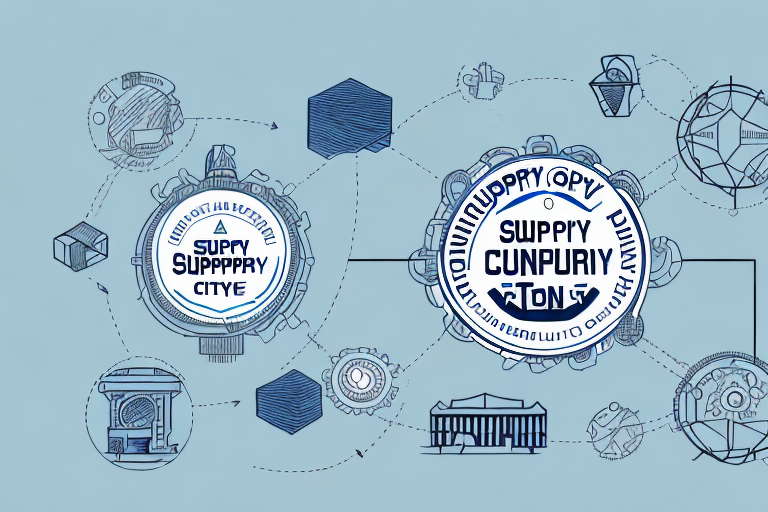Understanding the Benefits of a Continuous Customs Bond for Supply Chain Management
Successful supply chain management relies on a variety of factors, including timely and efficient transport, accurate documentation, and adherence to customs regulations. One tool that businesses can use to simplify compliance with customs regulations is a continuous customs bond. In this article, we will explore the benefits of using a continuous customs bond and provide guidance on how to obtain and manage one for your business.
What is a Continuous Customs Bond and How Does it Work?
A continuous customs bond is a type of surety bond that guarantees the payment of duties and taxes owed to customs officials. By obtaining a continuous customs bond, importers can streamline the process of moving goods across international borders. When goods are imported, customs officials may assess duties and taxes on those goods. Without a bond, the importer would need to pay those duties and taxes upfront before the goods can be released. However, with a continuous customs bond in place, the importer can defer payment until a later date.
To obtain a continuous customs bond, businesses must work with a surety company to underwrite and issue the bond. Importers typically pay an annual premium for the bond based on the value of the goods they are importing. The continuous bond remains in effect until it is canceled or a claim is made against it.
It is important to note that a continuous customs bond is not the same as a single-entry bond. A single-entry bond only covers one shipment, while a continuous bond covers all shipments made by the importer for a set period of time. This means that importers with a continuous bond do not need to obtain a new bond for each shipment, saving both time and money.
Additionally, a continuous customs bond can help importers avoid delays and penalties. If an importer fails to pay duties and taxes owed to customs officials, the bond can be used to cover the costs. This can prevent goods from being held at the border or seized by customs officials, which can result in costly delays and penalties.
The Importance of Customs Bonds in Supply Chain Management
Customs bonds play a crucial role in the supply chain management process. Without a bond, the process of importing goods can be fraught with delays, confusion, and costly fees. Bonds help businesses communicate with customs officials, manage their cash flow, and ensure that their goods can be released in a timely and efficient manner.
A continuous customs bond offers additional benefits by providing businesses with the flexibility to respond quickly to market demands without the administrative burden of obtaining a new bond for each shipment. According to the U.S. Customs and Border Protection, approximately 7 million shipments are processed daily, highlighting the importance of efficient bonding processes.
It is important to note that customs bonds are not a one-size-fits-all solution. The type of bond required will depend on the specific goods being imported, the country of origin, and the intended use of the goods. For example, a surety bond may be required for goods that are subject to certain regulations or restrictions, while a cash bond may be required for goods that are considered high-risk. It is essential for businesses to work with a knowledgeable customs broker or freight forwarder to determine the appropriate type of bond for their specific needs.
How a Continuous Customs Bond Can Save You Money on Import Duties
One of the primary benefits of a continuous customs bond is that it can help businesses save money on import duties. With a bond in place, businesses can defer payment of duties until a later date, which can help improve cash flow in the short term. According to ShipScience, effective cash flow management is critical for businesses dealing with international trade, and a customs bond facilitates this by reducing upfront financial burdens.
Additionally, a continuous customs bond can help businesses avoid costly penalties and fees associated with non-compliance. By being able to communicate with customs officials quickly and efficiently, businesses can ensure they meet all necessary requirements, keeping fees and penalties to a minimum.
Another advantage of having a continuous customs bond is the potential to expedite the customs clearance process. Customs officials may be more likely to release goods quickly when a bond is in place, as it provides assurance that the business is financially responsible and compliant with regulations. This can help businesses avoid delays and reduce costs associated with storage and demurrage fees.
Furthermore, a continuous customs bond offers greater flexibility in import operations. Businesses can import goods more frequently and in smaller quantities without the need to obtain a new bond for each shipment. This agility allows businesses to respond more swiftly to changes in demand and market conditions, fostering growth and expansion opportunities.
Avoiding Delays in the Shipping Process with a Continuous Customs Bond
Delays in the shipping process can cause significant disruptions in the supply chain, leading to frustration and financial losses for businesses. A continuous customs bond helps avoid such delays by ensuring that all necessary documentation and compliance requirements are met promptly. This allows businesses to keep their goods moving smoothly across borders.
With a continuous customs bond, importers can expedite the movement of goods by maintaining a good standing with customs officials. This proactive approach reduces the likelihood of goods being held up at customs, ensuring timely delivery to their final destination.
In addition to preventing delays, a continuous customs bond can provide financial benefits by eliminating the need for cash deposits or fees for each individual shipment. Instead, businesses pay a single annual premium for the bond, resulting in long-term cost savings, especially for those that import frequently or in large quantities.
The Role of a Broker in Obtaining and Managing a Continuous Customs Bond
Brokers play an essential role in obtaining and managing a continuous customs bond. They assist businesses in navigating the complex requirements and regulations associated with importing goods, ensuring that all necessary paperwork and documentation are in order.
Experienced brokers can also help businesses select the right surety company and negotiate the best possible rates for their continuous customs bond. By leveraging their industry expertise, brokers ensure that businesses obtain bonds that meet their specific needs while optimizing costs.
Additionally, brokers provide ongoing support in managing the bond, handling any claims that may arise, and keeping businesses informed about changes in customs regulations. This partnership allows businesses to focus on their core operations while maintaining compliance and financial security.
Simplifying the Process of Compliance with a Continuous Customs Bond
Compliance with customs regulations is a critical aspect of international trade. A continuous customs bond simplifies this process by providing a structured framework for meeting regulatory requirements.
With a bond in place, importers can easily communicate with customs officials, ensuring that all necessary documentation is submitted accurately and on time. This reduces the risk of errors that could lead to delays or fines.
Moreover, a continuous customs bond offers increased visibility into the supply chain, allowing businesses to monitor and manage their import activities more effectively. By proactively identifying and addressing potential compliance issues, businesses can maintain smooth operations and avoid costly disruptions.
How a Continuous Customs Bond Can Benefit Small Business Owners
Small business owners stand to gain significantly from utilizing a continuous customs bond. For small businesses engaged in international trade, managing cash flow is often a challenge. A continuous customs bond helps by deferring the payment of duties and taxes, freeing up capital for other critical business operations.
Additionally, customs bonds help small businesses avoid the financial strain of potential fines and penalties associated with non-compliance. This protection allows small businesses to operate with greater peace of mind and reduced risk.
Furthermore, a continuous customs bond empowers small businesses to seize new opportunities swiftly. By eliminating the need to obtain a new bond for each shipment, businesses can respond more quickly to market demands and expand their reach without administrative delays.
The Risks of Not Having a Continuous Customs Bond for Your Supply Chain
Failing to secure a continuous customs bond can expose your supply chain to several significant risks:
- Delays in Moving Goods: Without a bond, goods may be held at customs longer, disrupting supply chains and causing operational delays.
- Costly Fines and Penalties: Non-compliance with customs regulations can result in substantial fines and penalties, increasing operational costs.
- Increased Financial Risk: Fluctuating duties and taxes can create financial uncertainty, making it difficult to manage budgets effectively.
- Limited Responsiveness: The inability to act quickly on new opportunities or respond to market changes can hinder business growth.
To mitigate these risks, it is essential for businesses to secure a continuous customs bond and maintain compliance with all relevant regulations.
Understanding the Different Types of Customs Bonds Available for Your Business
Businesses have access to various types of customs bonds, each designed to meet different needs and circumstances. Understanding these options is crucial for selecting the right bond:
- Continuous Customs Bond: Covers all shipments for a set period, typically one year, providing ongoing coverage without the need for multiple bonds.
- Single Entry Bond: Covers a single shipment, suitable for businesses with infrequent import activities.
- Annual Import Bond: Provides coverage for all imports within a calendar year, similar to a continuous bond but aligned with the business's fiscal year.
By consulting with a broker or surety company, businesses can determine which type of bond best fits their import volume, frequency, and specific requirements.
How to Choose the Right Surety Company for Your Continuous Customs Bond
Choosing the right surety company is a critical decision when obtaining a continuous customs bond. Here are key factors to consider:
- Reputation: Select a surety company with a strong reputation for reliability and excellent customer service.
- Experience: Ensure the company has extensive experience in the customs bond industry and understands the specific needs of your business.
- Rates: Compare premium rates from different surety companies to find the most competitive pricing without compromising on coverage.
- Support Services: Look for companies that offer comprehensive support, including assistance with bond applications and claims management.
Partnering with a reputable and experienced surety company ensures that your continuous customs bond is managed efficiently and effectively.
Tips for Maintaining Compliance with Your Continuous Customs Bond
Maintaining compliance with customs regulations is essential for businesses with a continuous customs bond. Here are some tips to ensure ongoing compliance:
- Stay Informed: Keep up-to-date with changes in customs regulations and requirements by subscribing to industry newsletters and attending relevant seminars.
- Accurate Documentation: Ensure that all import documentation is accurate and submitted on time to avoid delays and penalties.
- Regular Audits: Conduct regular audits of your import processes to identify and rectify any compliance issues proactively.
- Work with Experts: Collaborate with experienced customs brokers or freight forwarders who can provide guidance and support in maintaining compliance.
- Effective Record-Keeping: Maintain organized and accessible records of all import transactions and bond-related documents.
By following these practices, businesses can maintain compliance, avoid penalties, and fully leverage the benefits of their continuous customs bond.
The Benefits of Working with an Experienced Broker in Managing Your Continuous Customs Bond
Partnering with an experienced broker offers numerous advantages in managing a continuous customs bond:
- Expert Guidance: Brokers provide expert advice on the best bond options tailored to your business needs.
- Streamlined Processes: They handle the complexities of bond applications and renewals, ensuring a hassle-free experience.
- Competitive Rates: Brokers leverage their industry connections to negotiate favorable rates with surety companies.
- Compliance Assurance: Experienced brokers help ensure that your business remains compliant with all customs regulations.
- Claims Management: In the event of a claim, brokers assist in navigating the process efficiently.
Working with a seasoned broker can enhance your ability to manage your continuous customs bond effectively, allowing you to focus on growing your business.
Case Studies: Real-Life Examples of the Benefits of a Continuous Customs Bond
Real-life case studies illustrate the tangible benefits of using a continuous customs bond:
- Company A: An e-commerce retailer increased its import volume by 50% after obtaining a continuous customs bond, resulting in faster shipping times and improved customer satisfaction.
- Company B: A manufacturing firm avoided significant fines and expedited the release of critical components by maintaining a continuous customs bond, ensuring uninterrupted production.
- Company C: A small business expanded into international markets seamlessly by leveraging a continuous customs bond, which provided the necessary financial assurance to customs authorities.
These examples demonstrate how a continuous customs bond can enhance operational efficiency, reduce financial risks, and support business growth.
The Future of Supply Chain Management and the Importance of Custom Bonds
The future of supply chain management is poised to involve increased automation, enhanced communication between businesses and customs officials, and a continued emphasis on reducing costs and increasing efficiency. Customs bonds will play a pivotal role in this evolving landscape by:
- Facilitating Automation: As supply chains become more automated, customs bonds will integrate with digital platforms to streamline compliance and payment processes.
- Enhancing Transparency: Improved communication tools will allow for better tracking and management of bonded transactions, reducing the potential for errors and delays.
- Supporting Sustainability: Efficient customs processes enabled by bonds can contribute to more sustainable supply chains by minimizing idle times and reducing the carbon footprint associated with delays.
- Adapting to Regulatory Changes: As international trade regulations evolve, customs bonds will adapt to ensure that businesses remain compliant without sacrificing efficiency.
To stay ahead in this dynamic environment, businesses should continue to prioritize customs compliance and explore innovative ways to optimize their supply chain management processes through the strategic use of customs bonds.




















